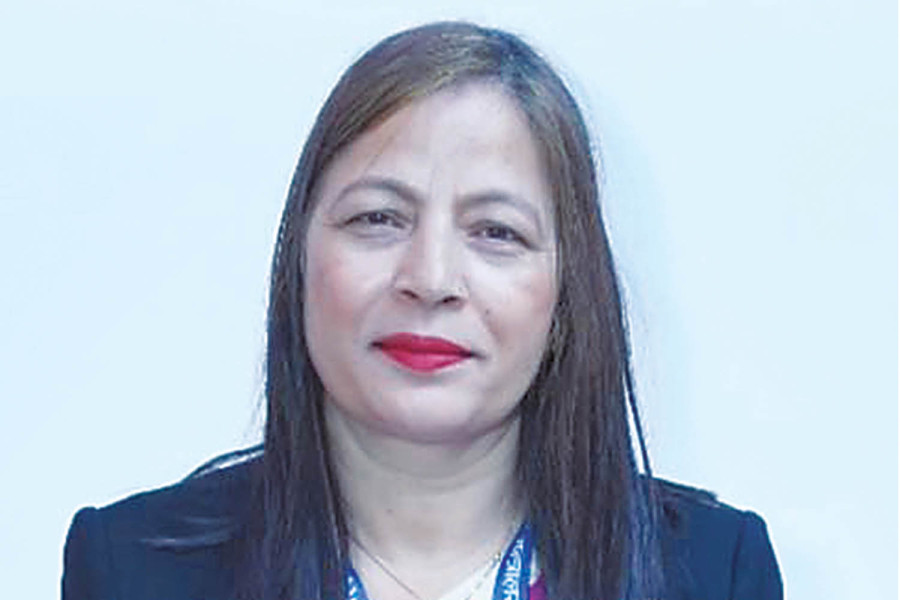National
Sewa Lamsal becomes Nepal’s first female foreign secretary
She is taking charge of the foreign ministry at a time when the country is grappling with complex geopolitics and diplomacy.
Anil Giri
Yet another glass ceiling has been broken in Nepal.
On Thursday, Sewa Lamsal, the senior-most joint-secretary at the Ministry of Foreign Affairs, was promoted to the post of foreign secretary. With this decision, she has made history by becoming the first female foreign secretary in the seven-decade-old history of the Nepali foreign service that started in 1948.
The 25th foreign secretary, she is the first woman to lead the country’s diplomacy, international relations, foreign affairs, and other functions of the foreign ministry, including passport distribution and consular affairs. Until her promotion to the post of secretary on Thursday, she had been heading the ministry’s ‘UN, international organisations, and international law division’ and also served as the ministry’s spokesperson.
She joined the foreign service in 2010 as an under-secretary and served as ambassador to Pakistan from 2016 to 2020, and then deputy permanent representative, and minister plenipotentiary at the Permanent Mission of Nepal to the United Nations. She was promoted to the post of joint secretary just a year after she made a lateral entry from administrative service to foreign service. Since then she served (for almost 13 years) as joint-secretary at the foreign ministry in various roles.
A meeting of the promotion recommendation committee headed by the chairman of the Public Service Commission, Madhav Prasad Regmi, nominated Lamsal for promotion last Friday.
The post of secretary had been vacant since December 6 following the retirement of Bharat Raj Paudyal, who is taking up his new assignment as Nepal’s ambassador to Canada.
“This is a proud and encouraging moment for Nepali women. It shows that women are as competent as men and can lead sensitive and important ministries like foreign affairs,” said Indra Adhikari, former deputy director at the Institute of Foreign Affairs. “This is also a good example of inclusive and participatory democracy.”
Born in Bhojpur, Lamsal will now lead the foreign ministry’s administration, which has around 360 staff, officials, and diplomats. In the past, Sahana Pradhan of the CPN-UML, Sujata Koirala of the Nepali Congress, and Bimala Rai Paudyal of the UML became foreign ministers, but there had been no female foreign secretary in the ministry’s 72-year history. She joined the civil service in October 1998 as a section officer at the Ministry of Women, Children and Senior Citizens.
“When women are appointed to high-ranking positions, there is a tendency to see their success as a gender-based favour or a result of quota,” said Adhikari, adding, “but Lamsal’s case is different. She is highly qualified and competent”.
One of her colleagues at the foreign ministry said Lamsal’s confidence level greatly increased in the past three years when she started rigorously interacting with top foreign politicians and diplomats.
There were many congratulatory messages on social media as soon as the government decided to promote her to the post of foreign secretary.
She is taking charge of the foreign ministry at a time when the country is grappling with various external challenges emanating from domestic compulsions, geopolitical considerations, complicated ties with India, China, and major powers, as well as in the conduct of labour and climate diplomacy. These challenges coincide with a shifting geopolitical landscape, and the need to boost the efficiency of the foreign ministry.
Among those praising her promotion is former ambassador to Egypt Rambhakta Thakur who posted on X: “Yes, she made a history but also I hope she will make a milestone of her diplomatic career. She should be very careful in making decisions. There is nothing above the nation. Our sincere wishes for her bright future [sic].”
Lamsal has a master’s degree in public administration from Tribhuvan University and completed her M.Phil in social change from the Norwegian University of Science and Technology.
“The breaking of the glass ceiling was not happening at the top bureaucratic level of foreign, finance, home, and defence ministries,” former foreign minister Bimala Rai Paudyal said, adding, “today the ceiling has broken at the foreign ministry, which is a very positive development.”
The other key ministries—finance, home and defence—should have female secretaries as well, said Paudyal.
Paudyal during her brief stint as foreign minister had worked with Lamsal. “She is professional, competent, and hardworking.”
“She built her career at the foreign ministry so she knows how to handle things. Second, she is hardworking and can strike a balance between work and life, which is vital for a Nepali woman,” said Paudyal.




 18.12°C Kathmandu
18.12°C Kathmandu














